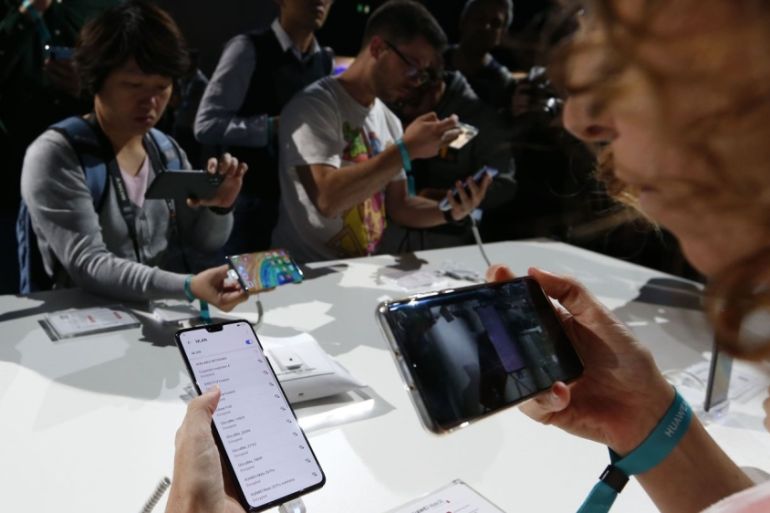US considered kicking Huawei out of its banking system: Sources
The White House National Security Council considered the proposal despite some officials deeming it a ‘nuclear option’.

The administration of United States President Donald Trump considered banning China‘s Huawei from the US financial system earlier this year as part of a host of policy options to thwart the blacklisted telecoms equipment giant, according to three people familiar with the matter. Huawei is the world’s second-largest smartphone producer.
The plan, which was ultimately shelved, called for placing Huawei Technologies Co Ltd on the US Department of the Treasury’s Specially Designated Nationals and Blocked Persons (SDN) list.
Keep reading
list of 3 itemsChina threatens to blacklist US firms over human rights disputes
US considers new regulations to further restrict Huawei suppliers
One of the people familiar with the matter, who favours the move, said it could be revived in the coming months, depending on how things go with Huawei.
The plan was considered by the White House National Security Council and seen by officials as a nuclear option atop a ladder of policy tools to sanction the company, two of the sources said. Such a designation can make it virtually impossible for a company to complete transactions in US dollars.
Administration officials drafted a memo and held interagency meetings on the issue, according to one of the sources. This showed the extent to which administration officials considered deploying their most aggressive sanctioning tool against the Chinese company.
The use of the SDN list was tabled in favour of other measures, such as placing Huawei on a trade blacklist, which forces some suppliers to obtain a special licence to sell to the company.
Huawei did not respond to a request for comment. A Treasury spokesperson said the agency “does not comment on investigations or prospective actions, including to confirm whether one exists”.
When asked about the Reuters report during a CNBC interview on Tuesday, US Commerce Secretary Wilbur Ross said the US is “always considering all sorts of measures against all kinds of companies. But I don’t believe there’s anything imminent this morning on that.”
Huawei would have been among the largest companies ever added to the list, which has included Iranian politicians, Venezuelan drug traffickers, Russian oligarchs and Russia’s Rusal, the world’s second-largest aluminium company.
Annie Fixler, a cyber expert at the Foundation for Defense of Democracies think-tank, said designating the company “would have broad, widespread implications for Huawei across the globe”, noting that its business would be “severely impacted” in Europe and Asia outside of China.
The US government has brought criminal charges against Huawei, alleging theft of trade secrets, bank fraud, and violations of US sanctions against Iran. It has also sought to convince allies to ban the company from 5G networks over spying fears.
But placing Huawei on the SDN list would mean a host of logistical, diplomatic, and economic difficulties for the US government.
The designation prohibits US companies or citizens from trading or conducting financial transactions with those listed, and freezes assets held in the US.
Adding Huawei would, therefore, hammer US allies that already rely on the company for their 4G networks, since almost all dollar payments clear through US financial institutions.
The Treasury could grant licences to exempt US banks involved in those transactions. But it has generally shied away from doing so, concerned that too many exemptions would blunt the strength of the tool, experts said.
Huawei’s sprawling size, with dozens of subsidiaries, would significantly complicate enforcement and carve-out efforts, experts said.
“The larger an entity is, the harder it is for a US administration to foresee and prepare for the major effects, foreign and domestic, that placing it on the SDN list may cause,” said Matthew Tuchband, a former Treasury official who added that careful consideration is needed before designating a company the size of Huawei.
Treasury Secretary Steven Mnuchin, who is seen by many China hawks in the administration as sympathetic to Beijing, has rarely overseen the use of the tool against China, designating a handful of Chinese persons for trafficking in the opioid drug fentanyl and for violations of sanctions against North Korea and Iran.
Nevertheless, some lawmakers still see designating Huawei as worth considering.
“Given Huawei’s relentless drive to dominate the 5G landscape, it is one of the most urgent national security threats facing the free world,” said Republican US Congressman Mike Gallagher. “All options should be on the table in order to impose maximum pressure.”